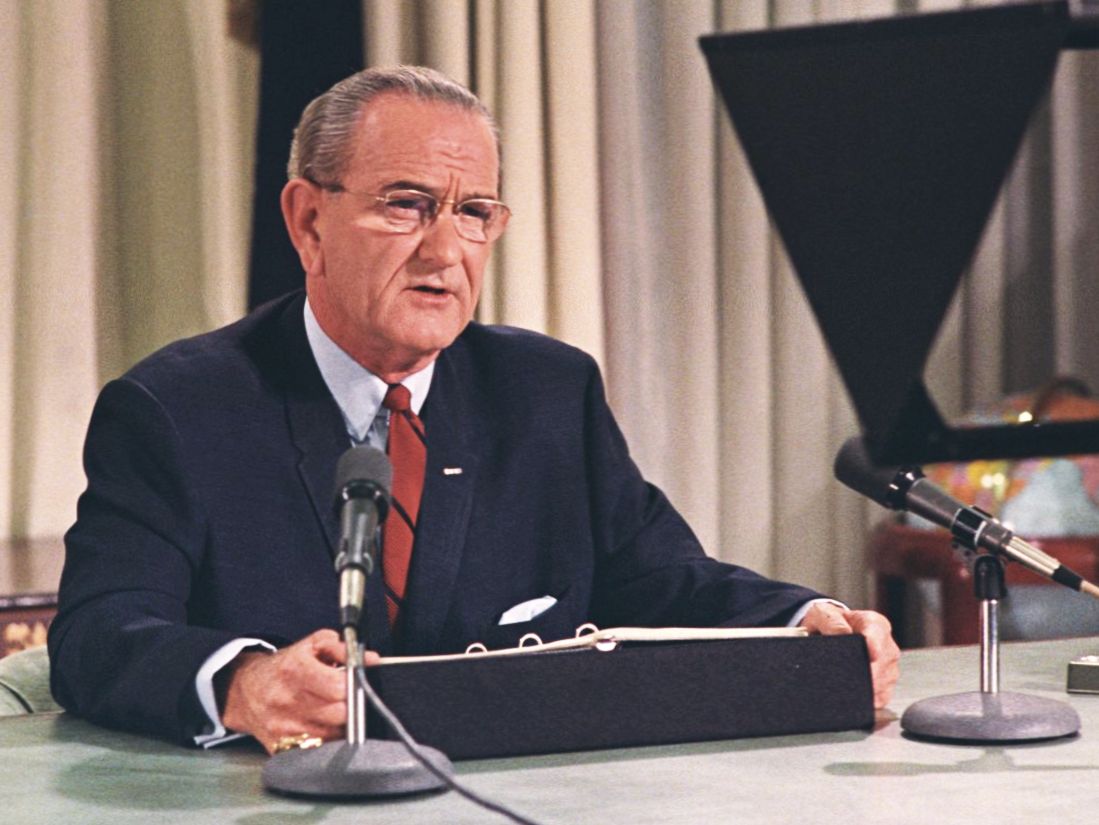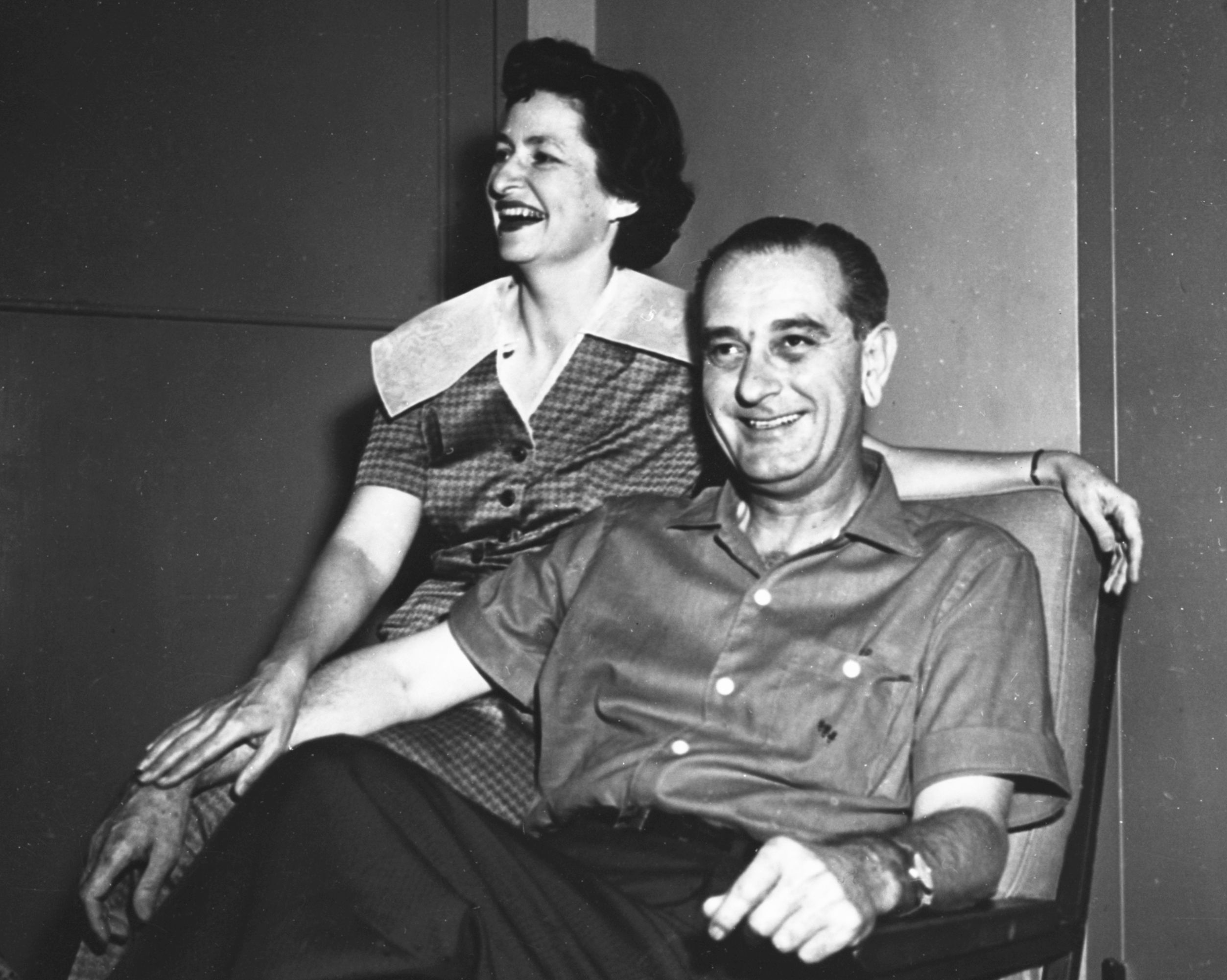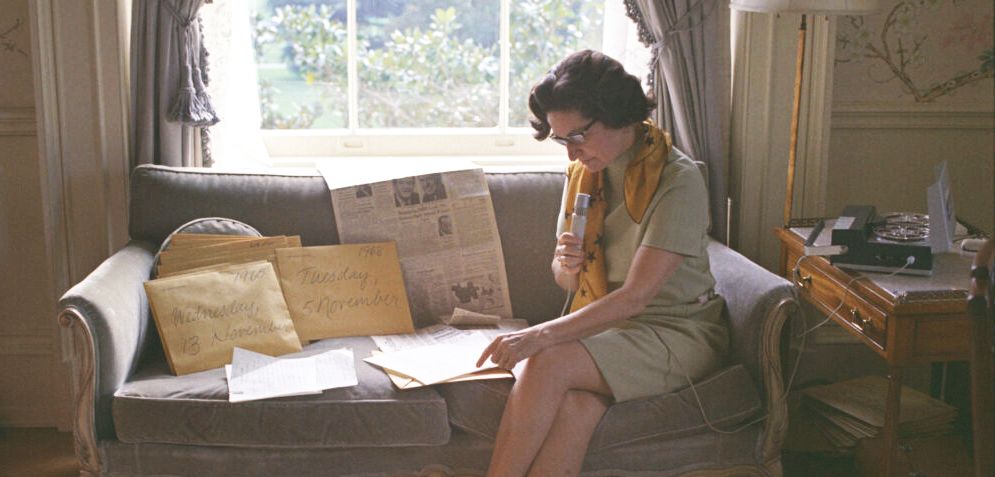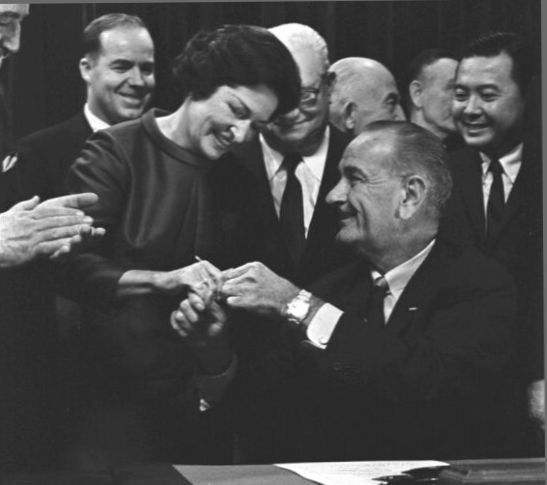President Johnson shocked the nation when he ended his bid for reelection in 1968. As early as 1964, Lady Bird had suggested that he might not want to run for a second term.
-
Summer 2024
Volume69Issue3
Editor’s Note: Too often, historians have underestimated the role that Lady Bird played in Lyndon Johnson’s political life. An important new biography paints a different picture: that this politically astute woman was intimately involved in advising her husband on political strategy and the evolution of his career. Julia Sweig is the author of the highly acclaimed New York Times bestseller, Lady Bird Johnson: Hiding in Plain Sight, from which portions of this essay were adapted.

Lyndon Johnson’s televised address from the Oval Office on March 31, 1968 was billed as a major statement on the war in Vietnam. After speaking for 39 minutes about his efforts to achieve peace in Southeast Asia, as well as taxes and the economy, the president made a dramatic and unexpected announcement: “I shall not seek, and I will not accept, the nomination of my party for another term as your president.”
LBJ’s decision to drop out of the 1968 race shocked his own White House, the national press corps, his many political adversaries of both parties, and Americans across the country. Only a few staffers, whom LBJ and wife Lady Bird had sworn to secrecy to help them craft his statement, knew of his plan in advance.
Very quickly, the explanations for Johnson’s decision congealed around the most apparent factors that, by March 1968, had so severely weakened his presidency: the Vietnam War, where the bombing and body bags coming home had riven the nation and thwarted LBJ’s ambitions for domestic renewal; Eugene McCarthy, whose loss by just eight points to the sitting president earlier that month in the New Hampshire primary had nevertheless signaled a precarious path to the nomination for Johnson; and Bobby Kennedy, whose entrance into the race a few days after McCarthy’s strong showing had, in any case, been anticipated by the Johnsons for years.
The many books and articles about the Johnson presidency largely repeat these explanations. Yet, what most historians and journalists miss in writing about Lyndon Johnson and, in this instance, his decision to stand for only one term, is the weight of Lady Bird’s influence within their marriage and on LBJ’s presidency, and the fact that, four years earlier, she had specifically pointed out that not running for a second term could be a sensible strategy.
In the spring of 1964, when LBJ was nearing the end of the presidential term he had assumed after the death of John F. Kennedy, he and Lady Bird deliberated whether should he run for president on his own, and if the risks to his health were too great. Nine years before, LBJ had suffered a near-fatal heart attack at the age of 46. Although he had quit his habit of smoking three packs of cigarettes a day and had recovered, his health was always on their mind.
Nearly six months into his presidency, Lady Bird decided to trade the tensions of the White House for a few days of relative solitude away from Washington. She went to Huntland, a borrowed estate of occasional presidential respite in the rolling horse country of Middleburg, Virginia, about an hour’s drive from the White House. It was May 13, 1964. The two days spanning Lady Bird’s arrival at her Virginia retreat and her return to Lyndon in Washington, D.C. marked a defining moment in their relationship, in their marriage, and in the Johnson presidency.
Lyndon had announced his War on Poverty, but hadn’t yet given his Great Society speech. He had begun the battle in Congress to pass the Civil Rights Act, but opposition from the South, from Republicans, and from within his own party was fierce, and mounting violence against civil rights activists was lethal. That day, before a roaring crowd of 18,000 people at Madison Square Garden, Arizona’s rock-jawed senator, Barry Goldwater, the leading Republican contender for the presidency, described LBJ as a “cheerleader for a frightful game of violence, destruction, and obedience” for his embrace of civil rights; Goldwater demanded “facts about how far we’re willing to go to appease communists” in Vietnam, Cuba, and the Soviet Union.
At the same time, Secretary of Defense Robert McNamara was making his fifth visit to Vietnam in nearly as many months, to assess whether the American ally in South Vietnam’s capital, Saigon, had the political and military wherewithal to stave off an increasingly virulent insurgency backed by the communist nationalists in Hanoi. Rattled by what he found, McNamara was scheduled to brief the president and make his recommendations for a qualitative and quantitative jump in American military assistance the next morning, May 14.

Lyndon hated Lady Bird’s absences. But he understood that they were essential to her ability to sustain the energy required to be married to him. Lady Bird found solace in the countryside. “Virginia in mid-May is balm for any trouble. No silent spring here,” she recorded, referring to Rachel Carson's influential book on threats to the environment: “The green arch of fresh spring leaves” over a country road and the vista of the Blue Ridge Mountains in the distance would help her flush from her system the political toxins of a federal city gearing up for a presidential campaign. The First Lady had invited two of the president’s doctors to Huntland for dinner to discuss Lyndon’s health, mental and physical, and its bearing on his state of mind about running for his own term in office.
She could see that LBJ already felt trapped. She had watched him as he watched himself struggling but failing to reject the logic of escalation presented to him by his civilian deputies and the military brass that spring. He was unable to visualize a path out of Vietnam that would not appear to members of both parties like capitulation to communism. A targeted air war, better planes, more money, more training, more advisers -- before he had even heard these recommendations from McNamara’s report about Saigon’s weakness and the powerful show of force from Hanoi, LBJ knew there would be no such thing as a limited war.
Between the image of a deeply flawed and corrupt ally in South Vietnam barely clinging to power, and the pressure from his political adversaries to step up the heat, Lyndon could already see Vietnam threatening to eclipse his ambitions for a presidency he wanted to be focused on repairing the cleavages of racial and economic inequality in his own country.
So, when he picked up the phone to say good night to Lady Bird before his briefings on Vietnam the next morning, and before Lady Bird’s meeting with his doctors, LBJ was looking ahead to the general election with the very familiar emotion that accompanied him on the eve of major decisions - this time, over whether to stand for election in November: pure, unmitigated dread. Mrs. Johnson was familiar with his dread, with the tone in his voice when he experienced it, with his need to ruminate, to explore all scenarios.
That evening was no different. On the phone, they talked and talked, and Lady Bird assured him that he must run, and she explained why. But Lyndon needed to see the case spelled out in black and white, and by a person of unimpeachable trust. To him, Lady Bird possessed such standing, and he asked her to write a memo setting forth the pros and cons, as she saw them, of running in the 1964 presidential election.

Bird’s dinner with her husband’s physicians was set for the next evening. She wanted to be in on the discussion about the findings of Lyndon’s cardiologist and personal physician, without having to sit through a White House meeting as opinions about the president’s fitness were bandied about. She especially wanted to pre-empt Lyndon’s likely attempt to elicit some sort of cautionary doctor’s note, using his health as an excuse not to run.
With LBJ’s doctors all to herself in Virginia, after dinner, the First Lady guided the conversation to the “psychological aspects” of “Lyndon’s problems,” by which she meant that, however miserable the president felt at the moment, “inaction, idleness, and lack of command would be a harder role for him than the long hours and heavy responsibility he now shoulders.”
The two doctors concurred and agreed to call Lady Bird the next day after examining Lyndon. It was not the first and would not be the last instance when she sought out LBJ’s doctors to get their views about her husband’s readiness to run. But, as much as they seemed to understand the internal dynamics animating the president, what they could not see, and what she did not share, was her own doubt about the threat of Vietnam. “I don’t know, though, that either one really understands the depth of his pain, when and if he faces up to the possibility of sending many thousands American boys to Viet Nam.”
Already in 1964, the conflict in Southeast Asia had filtered into Lady Bird’s diary, and this reference indicates how the realities of the war had become both a symbol and the emotional fact of his and their vision of his presidency.
When she sat down to write her memo for Lyndon, laying out her analysis of his options, Lady Bird marshaled all her gifts as a media-savvy wife, confidant, career and business partner, and political adviser. And she did so as perhaps the only person with full knowledge of her husband’s greatest strengths, weaknesses, ambition, ambivalence, and, crucially, with his complete trust. Just as is important, she was able to distill what each of them needed as individuals and for the well-being of their marriage as it entered its fourth decade.
In essence, Lady Bird Johnson’s strategy memo allowed her husband to choose the degree of pain he felt he could endure, based on the choices she set forth. She started off by providing him with a draft announcement of his resignation, one she later dictated into her recorder with the tone and authority of a newscast -- a shrewd starting point, because the statement forced her husband to digest at the outset the potent emotional impact of taking such a radical step. Her voice was clipped and authoritative:
She sighed into the recorder and quickly added, “I hope he won’t use it. That’s that!” She then outlined the president’s options as he looked to the 1964 election, as well as her perception of their consequences. First, she set forth the likely outcomes should he decline to run in November:
And, over the phone with Lyndon and in her diary, she posed the excruciating question: Having walked away from a run at becoming president of the United States as a result of an electoral mandate, rather than an assassination, would living longer even be worth it? Only the intimacy of the many decades of marriage and political partnership could safely allow for such an unvarnished expression of the truth.
Setting forth what to anticipate should he run for the presidency and emerge the victor, the second part of the memo contained her answer:
That will be painful.
Then, Lady Bird gave her husband a point in time after which he might safely unburden himself and embark upon his post-presidential years with a feeling of satisfaction, rather than regret over roads not taken.
“If you win,” she concluded, “let’s do the best we can for three years and three or four months.” Why such specificity? “And then, the Lord letting us live that long, announce in Feb. or Mar., 1968 that you are not a candidate for re-election.” Without knowing how Vietnam or Martin Luther King or Eugene McCarthy or Bobby Kennedy or urban riots or massive protests would rock LBJ’s presidency, barely six months out from JFK’s assassination, Lady Bird Johnson had projected that, by February or March 1968, Lyndon Johnson might well feel the need to walk away from the American presidency.
With Lyndon turning a “mellow 60” by the end of that term, she wrote, “I believe the juices of life will be stilled enough to let you come home in relative peace and acceptance. (We may even have grand-children!).” She signed what was both a strategy memo and a love letter “Your Loving Wife.’

She gave the memo, sealed in an envelope marked “Personal, please,” to the doctors and sent them back to Washington with instructions to deliver it to Lyndon. And, of course, it was personal. But in its structure, argument, and conclusion, it was also far more than a private note from one spouse to the other.
It stands out as a political-strategy document that would set the course for the arc of the Johnson presidency.
There was nothing about the president’s day - a staff meeting, a Vietnam briefing, a congressional lunch, a congressional funeral, and a late-night appearance at a party for Justice William Douglas, all on barely four hours’ sleep - that had altered his frame of mind about the future when a “lonesome-sounding Lyndon” called Bird after midnight. Theirs “was a sad-happy talk,” Lady Bird recorded, about her own troubles and “about his restive desires to seek a way out of the burdens he carries.”
We don’t know exactly when Lyndon read the content of the sealed envelope. Nonetheless, over the course of the spring and summer of 1964, neither his ambition regarding the Great Society and the passage of the Civil Rights Act, nor his wife’s arguments in favor of running immediately helped clarify his decision to seek reelection that fall. That would require Lady Bird to do battle with yet another round of dread and paralysis a few months later.
But the strategy outlined in the Huntland options memo did make a lasting, indelible impression. Just as Lady Bird had suggested at the end of her memo to him, on March 31, 1968, Lyndon Johnson concluded his televised address with the surprise announcement that he would not run for a second term of office.
Four years earlier, Lady Bird had given her husband the very timeline and exit strategy that, from the “depth of his pain,” Lyndon Baines Johnson would ultimately follow.
Author's note: The Huntland memo was included in a letter from Lady Bird Johnson to LBJ on May 14, 1964, filed in the LBJ Library, and reprinted in Johnson, Lyndon B.,Vantage Point: Perspectives of the Presidency, 1963-1969, (New York: Holt, Rinehart, and Winston, 1971), page 93-94.

